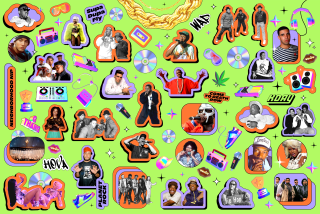BIT OF AMERICANA : JUKEBOXES A WINNING SELECTION
- Share via
From dusty truck stop to mom-and-pop malt shop; from bar to roadhouse to bowling alley, the jukebox has established itself as a distinctly American form of entertainment.
The first coin-operated phonograph appeared in 1889, and soon music fans were hearing their favorite songs, via individual listening tubes, in phonograph parlors. But it wasn’t until 1927, when the American Music Instrument Co. released the first electrically amplified multisection phonograph, that folks began to gather around these machines and dance.
They danced fox trots, tangos and waltzes. They danced in Southern “juke joints,” where the name “jukebox” is said to have originated. And soon they were dancing to Big Band music. By the start of World War II, the jukebox was squarely in the midst of its golden age. With colorful--sometimes garish--art deco-inspired designs, the machines were made to be the center of attention.
Rock ‘n’ roll came along in the ‘50s and embraced the jukebox, too. When Chuck Berry yearned to be “Back in the U.S.A.,” one of his fondest recollections was of that “jukebox jumpin’ with records.” And when “Happy Days” re-created the ‘50s for a generation of television viewers, the familiar opening shot featured--what else?--a jukebox.
The colorful past of the jukebox has made it a prime target for the nostalgia market, and a vintage machine can command thousands of dollars from collectors. But the jukebox is not entirely a creature of the past, according to Phil Scarborough, owner of Star Service in Fullerton.
Star Service sells, leases and services “coin-operated amusement devices,” a category that includes jukeboxes as well as video games, pinball machines and pool tables. Scarborough said the jukebox is still standard equipment in such establishments as bars and taverns, restaurants and nightclubs. And, he added: “I don’t anticipate that changing.”
Scarborough also pointed out that collectors aren’t the only ones bringing jukeboxes into the living room. In a typical month, he sells several jukeboxes, priced anywhere from $400 to $1,200, to people looking for a solid used machine for the home, rather than a collectible model.
Jukeboxes can be rented for special occasions. Party Music Catered by Louise in Anaheim specializes in jukebox party rentals. Owner Louise Palmer has 43 jukeboxes, which customers can program to fit the theme of the gathering. Palmer stocks the boxes from her collection of more than 100,000 records. A flat fee of $100 or more, depending on the location, includes pickup and delivery.
A look at modern jukeboxes quickly brings home the fact that the machines have changed since the days of brightly colored plastic and bubble tubes. Since the 1960s, jukeboxes have had a more subdued look--most could be mistaken for cigarette machines at first glance. And the jukebox, once called a nickel-in-the-slot machine, now usually costs a quarter a song, and some machines even accept $1 and $5 bills for multiple selections.
On the other hand, the advent of stereo sound and solid-state circuitry, often coupled with elaborate speaker systems, has considerably improved jukebox sound quality.
The latest breakthrough is the application of compact-disc technology to the jukebox. Seeburg Inc. of Addison, Ill., and Sony Corp. have jointly designed a compact-disc jukebox that will be unveiled at the Amusement and Music Operators Assn. Convention in Chicago this weekend. Compact-disc jukeboxes, in addition to providing improved sound quality, allow more selections, easier scanning, the ability to play an entire album and the elimination of an old jukebox problem--records that wear out.
In the meantime, though, the traditional Seeburgs, Wurlitzers, Rock-Ola’s and AMIs still reign. Chick Flodter, who has tended bar in Orange County for six years, said the jukebox has been an essential part of the businesses for which he has worked.
Flodter now tends bar at the Lord Bull in Orange, a typical neighborhood tavern offering pool, darts, a full bar and live country music three nights a week. Near the bar’s entrance is the jukebox, an inconspicuous machine offering everything from Prince’s “Erotic City” to selections by Sam Cooke, Willie Nelson and Men Without Hats.
The machine gets heavy use, particularly at night, Flodter said. When asked for some favorite selections, Flodter quickly rattled off the numbers of a half dozen country hits. The Lord Bull would probably lose business if it removed its jukebox, Flodter said. But then, he added, “any bar would.”
More to Read
The biggest entertainment stories
Get our big stories about Hollywood, film, television, music, arts, culture and more right in your inbox as soon as they publish.
You may occasionally receive promotional content from the Los Angeles Times.










